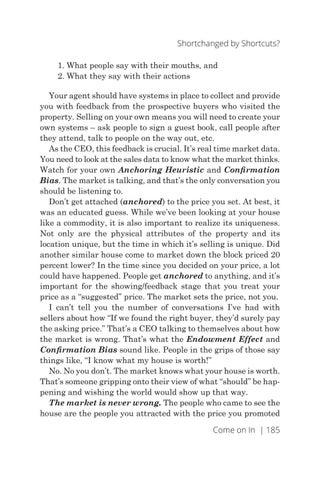Shortchanged by Shortcuts? 1. What people say with their mouths, and 2. What they say with their actions Your agent should have systems in place to collect and provide you with feedback from the prospective buyers who visited the property. Selling on your own means you will need to create your own systems – ask people to sign a guest book, call people after they attend, talk to people on the way out, etc. As the CEO, this feedback is crucial. It’s real time market data. You need to look at the sales data to know what the market thinks. Watch for your own Anchoring Heuristic and Confirmation Bias. The market is talking, and that’s the only conversation you should be listening to. Don’t get attached (anchored) to the price you set. At best, it was an educated guess. While we’ve been looking at your house like a commodity, it is also important to realize its uniqueness. Not only are the physical attributes of the property and its location unique, but the time in which it’s selling is unique. Did another similar house come to market down the block priced 20 percent lower? In the time since you decided on your price, a lot could have happened. People get anchored to anything, and it’s important for the showing/feedback stage that you treat your price as a “suggested” price. The market sets the price, not you. I can’t tell you the number of conversations I’ve had with sellers about how “If we found the right buyer, they’d surely pay the asking price.” That’s a CEO talking to themselves about how the market is wrong. That’s what the Endowment Effect and Confirmation Bias sound like. People in the grips of those say things like, “I know what my house is worth!” No. No you don’t. The market knows what your house is worth. That’s someone gripping onto their view of what “should” be happening and wishing the world would show up that way. The market is never wrong. The people who came to see the house are the people you attracted with the price you promoted Come on In | 185
Issuu converts static files into: digital portfolios, online yearbooks, online catalogs, digital photo albums and more. Sign up and create your flipbook.




